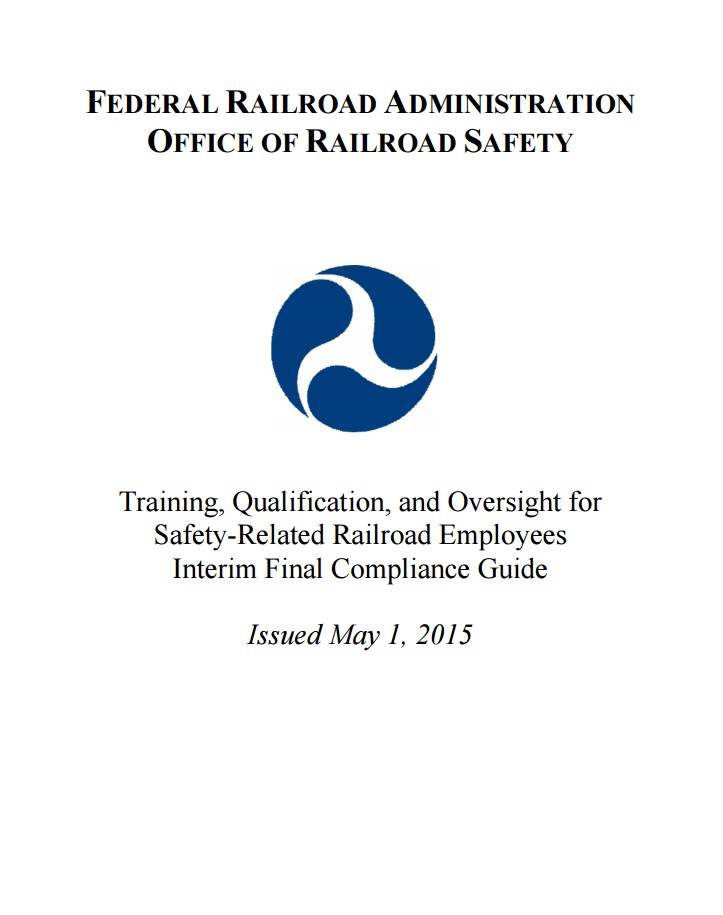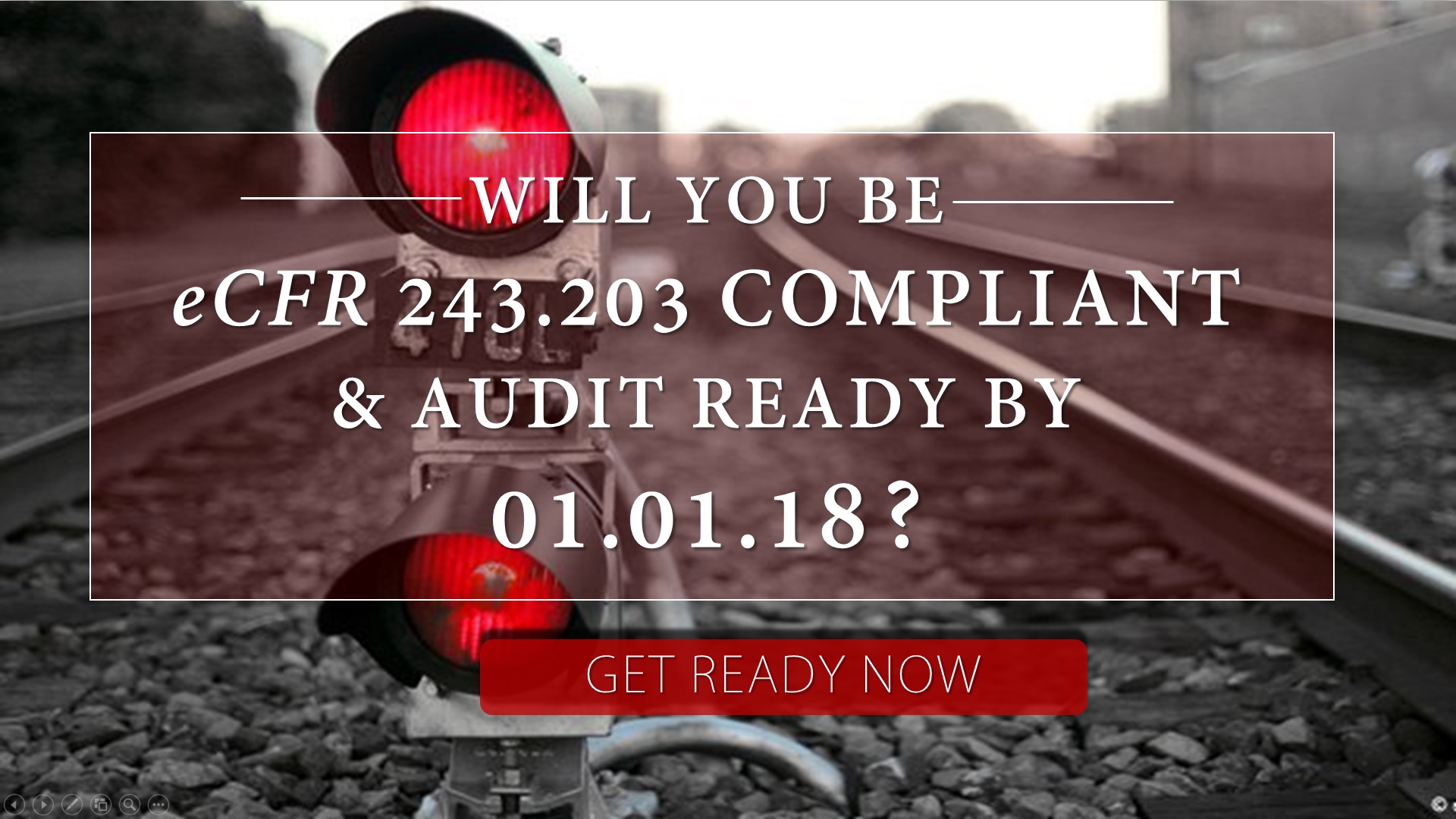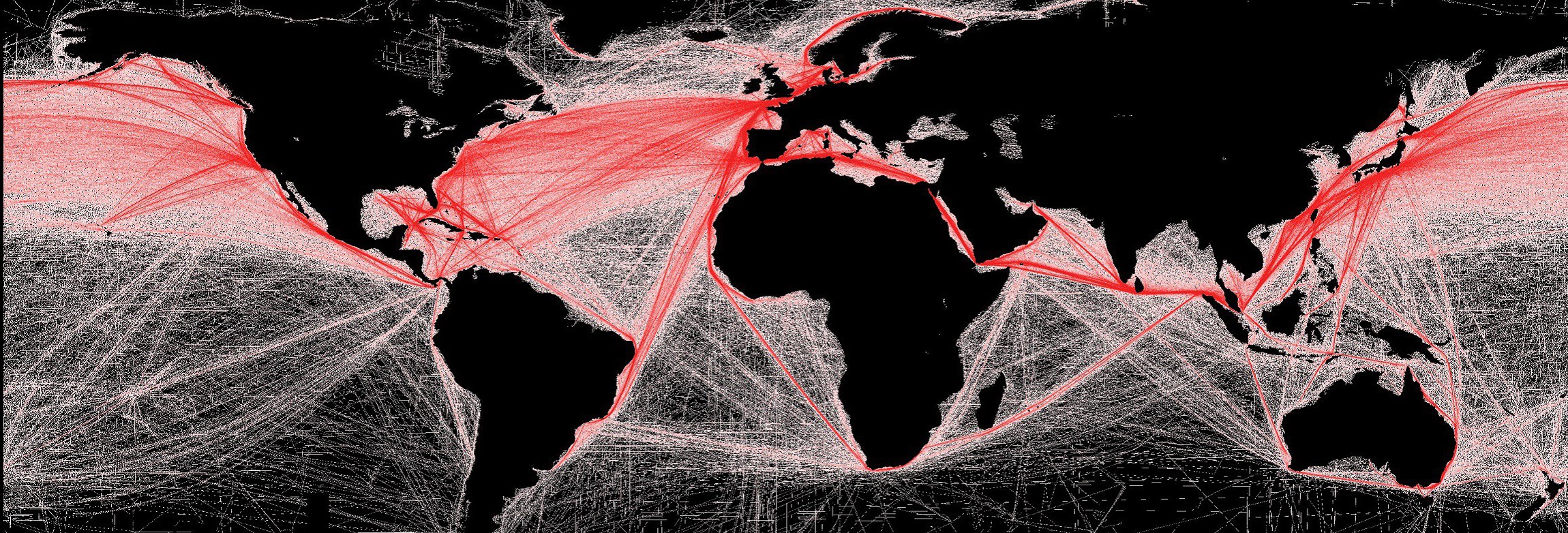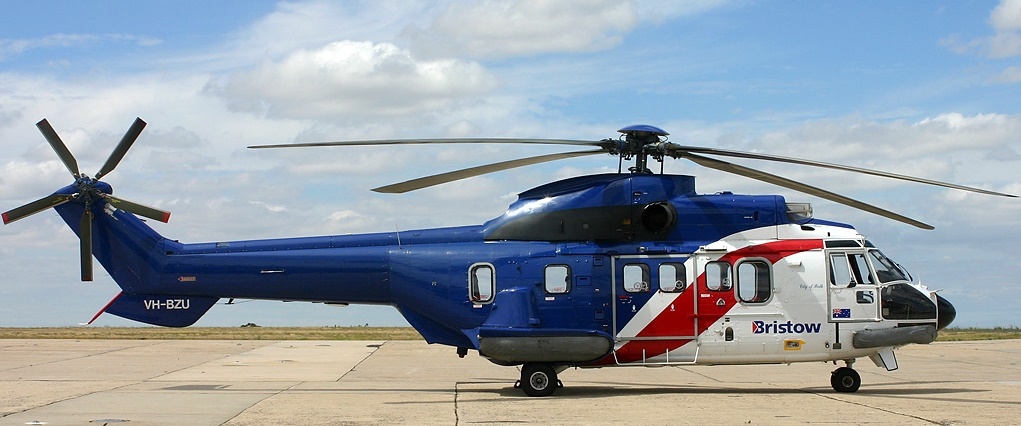FRA Railroad Training Guide & FAQs
FEDERAL RAILROAD ADMINISTRATION OFFICE OF RAILROAD SAFETY – Training, Qualification, and Oversight for Safety-Related Railroad Employees Interim Final Compliance Guide Issued May 1, 2015
The Rail Safety Improvement Act of 2008 (RSIA) required that the Secretary of the U.S. Department of Transportation (DOT) establish minimum training standards for all safety-related railroad employees. See 49 USC 20162. To comply with that statutory mandate, FRA published a final rule on November 7, 2014, establishing a new CFR part (Part 243), which requires each railroad or contractor that employs one or more safety-related railroad employee to develop and submit a training program to FRA for approval and to designate the minimum training qualifications for each occupational category of employee. The rule also requires most employers to conduct periodic oversight of their own employees and annual written reviews of their training programs to close performance gaps. The purpose of this guide is to illustrate acceptable methods for complying with the rule, provide the requirements in a different format that should allow for quicker and easier comprehension, and provide answers to questions that are likely to be frequently asked. This guide should permit employers of any size a quick way of determining whether the employer’s training program is likely to be found by FRA to be compliant with the final rule.
Railroad Training FAQs
Q I work for a railroad association and we plan to develop several model programs for use by railroads that have less than 400k employee work hours annually. Does my association or any railroad that intends to use our model programs have to wait on FRA approval before adopting and complying with the submitted training programs?
A Model programs submitted to FRA prior to May 1, 2017 are considered approved and may be implemented 180 days after date of submission, unless the FRA notifies the organization that developed and submitted the program that it (the program), contains deficiencies. Thus, it would be prudent not to share the model program until explicit approval is received, or 180 days after the date of submission and contacting FRA to confirm implicit approval.
Q When do I have to submit a training program to FRA for review and approval if I am a Training Organization or Learning Institution?
A If you represent a Training Organization or Learning Institutions that has provided training to safety-related employees prior to January 1, 2017, you may continue without FRA approval until January 1, 2018. However, you may not continue to offer training services beyond January 1, 2018 unless your programs have been approved by FRA.
Q What is the benefit of using a model training program?
A If the program is designed and developed correctly, it can save you, as an employer, time and money by allowing you to tailor the program to fit your operational needs.
Q I am a brakeman for a very small railroad. My railroad employs only six other train and engine service employees including me. I have been working in the same job since January 2013. Does this regulation mean I have to be trained all over again?
A No, in your case, you would be grandfathered assuming your employer declared your occupational category/sub-category (job title), no later than February 1, 2020. However, you will be subject to refresher training either 3 calendar years from your prior training event or no later than December 31, 2023.
Q What about railroads not in existence yet. For example, let’s assume a railroad goes in business on February 1, 2018, and they hire people with no previous railroad experience or training. What would FRA expect in terms of training?
A In this case, before a new employee can become a qualified member of an occupational category/sub-category, the employee must first successfully complete all formal training curriculums for that occupational category/sub-category.
Q Will FRA provide any grace period in terms of enforcement and citing violations?
A Yes, as with all new regulations, FRA understands that it will take some time for employers to learn how to comply with this regulation. FRA will be working hard to help employers, particularly small entities to comply with this regulation. However, FRA is not likely to be too lenient in cases where gross disregard for compliance is observed.
Q I own a small railroad in Oklahoma. I have eight fulltime employees including myself. Do I have to conduct Annual Reviews?
A No, annual reviews are not required on railroads with <400k total employee work hours annually. Contractors are included in this exception, but contractors shall use any information provided by a railroad to adjust its training specific to Federal railroad safety laws, regulations, and orders particular to FRA regulated personal and work group safety.
Q I am a training manager for a Class I railroad and responsible for submitting our training program(s) to FRA for approval. Does my employer have to wait on FRA approval before adopting and complying with the submitted training program(s)?
A No, your employer (railroad) may adopt and comply with any training program upon submission. However, your programs must be submitted to FRA no later than January 1, 2018.
Q In the context of this regulation what does designating a safety-related employee mean?
A It means that employers (railroads and contractors), must declare which occupational category/subcategory its employees belong to, and thus the employer is confirming the employees are trained and qualified on relevant Federal railroad safety laws, regulations, and orders, as well as any relevant railroad rules and procedures to implement Federal railroad safety laws, regulations, and orders.
Q I am a journeyman carman for a Class I railroad. I have been working in the same job since 1990. Does this regulation mean I have to be trained all over again?
A No, in your case, you would be grandfathered assuming your employer declared your occupational category/sub-category (job title), no later than September 1, 2018. However, you will be subject to refresher training either 3 calendar years from your prior training event or no later than December 31, 2022.
Q I am confused about Periodic Oversight. Please summarize what I am responsible for as a transportation operations supervisor employed by a large railroad. We have railroad employees as well as contractors at the facility I work at. One contactor on our property conducts inspections and air brake tests on our freight trains at an adjacent intermodal facility. Another contractor we use performs extensive track maintenance on our entire railroad division.
A Periodic Oversight applies to both large and small railroads, as well as some contractors. If the contractor(s) on your railroad employs more than 15 employees, directly trains its own employees for safety-related duties, and employs supervisors capable of Periodic Oversight, the contractor is obliged to provide oversight of its own employees. Furthermore, the railroad you work for is not responsible for conducting oversight, if there are no supervisors qualified to conduct Periodic Oversight of contractor employees, the contractor is responsible. Please note that a contractor that is not required to conduct periodic oversight may voluntarily agree to provide such oversight of its own employees to relieve a railroad that may be required to provide the oversight. The focus of the Periodic Oversight is limited to tests and/or observations of safety-related employees engaged in activities connected with 49 CFR Part 214 Railroad Workplace Safety, Part 218 Railroad Operating Practices, and Part 220 Railroad Communications. Conversely, if you are qualified, nothing precludes you from conducting oversight of contractor employees, but you are required to notify the contractor employee and his/her employer of any non-compliance observed. At its option, railroads may train contractors to provide Periodic Oversight. Excluding locomotive engineers and conductors, you are still responsible for conducting Periodic Oversight of other safety-related employees employed by your railroad, but you must be qualified to do so.
Q I noticed that this rule requires refresher training every 3 years, but in other FRA regulations a shorter refresher training period is required. When there are competing periods, which applies?
A This final rule does not exempt any other FRA regulation that may have more stringent requirements. Thus, the shorter refresher period would apply.
Q Are manufacturers or lessors of rolling stock covered by this regulation?
A The answer is yes if your company has any contractual obligation to inspect, repair, or maintain the equipment for the railroad in compliance with Federal railroad safety laws, regulations, and orders, regardless of whether those actions are taken on or off railroad property. Otherwise, a company that merely sells or leases equipment would not be covered by this rule.
Q Which railroad employee crafts are impacted by this regulation?
A This regulation (49 CFR Part 243) uses the term “Safety-Related Railroad Employee” to define those categories of employees impacted by the regulation as follows: • Employees covered by the Hours of Service laws, • Employees performing work as an operating employee, even if not covered by the Hours of Service laws, • All engineering (MOW) including bridge workers who inspect, install, repair, or maintain track, roadbed, and signal and communication systems, • Mechanical personnel who inspect, install, or repair any locomotive, passenger car, freight car, or MOW vehicle, • Any person who, as a primary duty, directly instructs, mentors, inspects, or tests others engaged in a safety-related task (includes first line supervisors of operating employees).
Q How can a tourist, scenic, historic, or excursion railroad or a contractor to one of those types of operations, readily determine if this rule applies to it?
A If the railroad operates on the general railroad system of transportation and the employer (railroad or contractor) employs at least one employee required to comply with Federal railroad safety laws, regulations, and orders, then the employer must comply with this rule.
Q Does this rule cover hazardous materials training?
A No.
Q I noticed this regulation made reference to amendments to Part 214, Subpart C – Roadway Worker Protections. What do the amendments to Part 214 entail and when is the effective date?
A The amendments to Part 214 require roadway workers that operate roadway maintenance machines equipped with a boom or crane to be trained and qualified according to a training program adopted by the employer. The program does not have to be submitted to FRA. The training must ensure that the operator understands either (1) the manufacturer’s safety instructions found in the manual or (2) the safety instructions developed to replace the manual when the machine has been adapted for a specific railroad use. The training must address both safe movement of the vehicles and safe operation of the boom or crane. Training is required for new users and, periodic training is required for those previously trained. The amendments to Part 214 offer a training compliance alternative to an existing OSHA mandate impacting roadway workers that operate roadway maintenance machines equipped with a boom or crane. Thus, employers have the option of complying with OSHA standards (29 CFR § 1926.1427) or FRA standards (49 CFR § 214.357. The effective date of § 214.357 was January 6, 2015. Issued May 1, 2015 Page 4 of 101.
Q It is January 1, 2018. I worked in the railroad industry for almost 20 years and held many positions beginning with laborer, machine operator, track inspector, roadmaster, and track trainer. I developed numerous training programs for track workers during my last five years on the railroad. For the last three years, I have been working as a training consultant and I have several short line railroads as my clients. I have developed a track worker training program that I can tailor to each of my short line railroad clients. Am I required to do anything under FRA’s Part 243 training regulation?
A Although you could choose to do nothing and make each of your clients file for FRA-approval with your program identified as the employer client’s program, FRA believes that it would be more beneficial to you and your clients if you submit your program under the § 243.111 provision for approval of programs filed by training organizations or learning institutions. Benefits to You and Your Railroad Clients If You are a Training Organization • You can tell current and prospective clients that your consultant business and program are FRA-approved. [If you do not get approval and falsely claim you did, FRA may initiate civil enforcement action against you, including but not limited to imposing civil money penalties against you and your company.] • You can tell a client to provide your unique training program name and identifier, so the client does not have to submit your program to FRA. • You or the client could seek FRA-approval if any tailoring modifications to the program were necessary. • Clients could still arrange for their own job-related practice or practice related feedback sessions to supplement your training program as long as the client described the supplemental training to FRA in the client’s submission. Requirements For You If You are a Training Organization • You will need FRA-approval prior to initiating any training for your clients. • With any of your training programs submitted, you must provide FRA with the following information about your company: Your full corporate or business name, Your primary business and email address, Your primary telephone number and point of contact, List of designated instructors (DI), A resume for each DI showing how subject matter expertise and how training experience was acquired, List of references of employer clients if training services were provided before the date you are filing with FRA for approval, Brief, but detailed summary statement indicating how you determined the knowledge, skills, and abilities necessary to develop training courses for safety related railroad employees. • Because training organizations and learning institutions are typically junior colleges or technical trade schools, FRA expects these organizations may accept independent students, who are not affiliated with a railroad or contractor employer. For this reason, FRA requires that these organizations maintain records for each student and you will too unless you request a waiver from the requirements found in 49 CFR § 243.111(g) and (h), explaining that the employer has agreed to maintain the employees’ records. See 49 CFR § 211.41 (describing the requirements for filing a waiver). If you will not accept independent students, FRA anticipates that it would likely grant such a waiver.
Source: Federal Railroad Administration
















